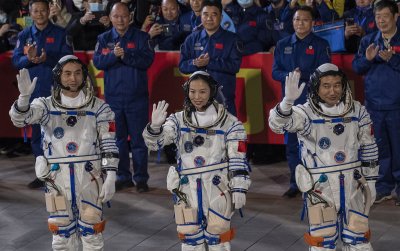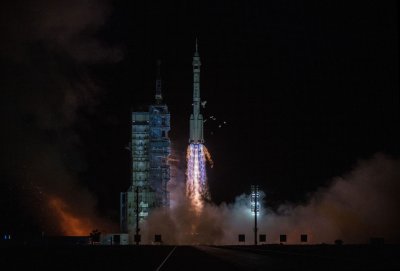China says its new space station had to perform evasive maneuvers twice in four months to avoid satellites belonging to SpaceX's Starlink project, according to a note Beijing sent to the United Nations.
The December 3 note verbale, a semi-formal notification, was recorded on the website of the UN Office for Outer Space Affairs. In it, China's Mission to the UN asked Secretary-General António Guterres to remind the United States about responsible activities in space.
Tianhe, the 55-foot-long core module of the Chinese space station Tiangong, was launched into orbit on April 29 and maintained a stable altitude of around 242 miles, said the note. On June 17, China launched Shenzhou 12, its first crewed mission to the station and the country's longest manned mission to date, lasting until September 17.
According to Chinese accounts, Tianhe's first near miss with a SpaceX internet satellite—Starlink-1095—occurred just two weeks later as Beijing opened nationwide celebrations marking the 100th anniversary of the Chinese Communist Party on July 1. The satellite had moved to an altitude of around 237 miles at the end of June, and Tianhe was forced to conduct an evasive maneuver "to avoid a potential collision between the two spacecraft," Beijing said.



The second incident happened on October 21 and involved Starlink-2305, the notification said. "To ensure the safety and lives of in-orbit astronauts, the China Space Station performed an evasive maneuver again on the same day to avoid a potential collision between the two spacecraft."
At the time, Tianhe, which houses the module's living quarters and life support systems, was already occupied by a new crew of taikonauts, who had launched on Shenzhou 13 on October 15. The trio have lived on the outpost for more than 70 days and will surpass Shenzhou 12's mission length when they return to Earth in April 2022.
China classed both incidents as constituting "dangers to the life or health of astronauts aboard the China Space Station." It requested that Guterres circulate the note to all parties of the Outer Space Treaty and remind the signatories of their responsibilities under Article 6:
"States Parties to the Treaty shall bear international responsibility for national activities in outer space, including the moon and other celestial bodies, whether such activities are carried on by governmental agencies or by non-governmental entities, and for assuring that national activities are carried out in conformity with the provisions set forth in the present Treaty."
The note verbale was reported by Chinese journalist Zichen Wang, of China's official news service Xinhua. On Tuesday, China's Foreign Ministry spokesperson Zhao Lijian accused the U.S. of "ignoring its obligations under the Outer Space Treaty and putting the lives of astronauts under serious threat."
Neither SpaceX nor its CEO, Elon Musk, has responded to the incident. Newsweek contacted the State Department for comment.
Communist Party newspaper the Global Times speculated that both near misses could have been deliberate attempts by SpaceX to test China's responses in space.
In addition to two Shenzhou missions this year, China also conducted Tianzhou 2 and 3 cargo launches in May and September, respectively. Shenzhou 14 and Tianzhou 4, as well as the launches of other space station modules, are scheduled for 2022.
SpaceX, meanwhile, has put nearly 1,900 satellites in low-Earth orbit since Musk's connectivity project began six years ago. The U.S. government-approved network is expected to number in the tens of thousands.


Post a Comment